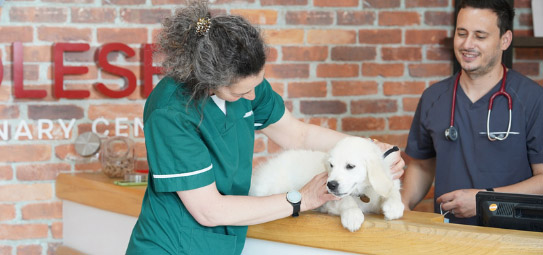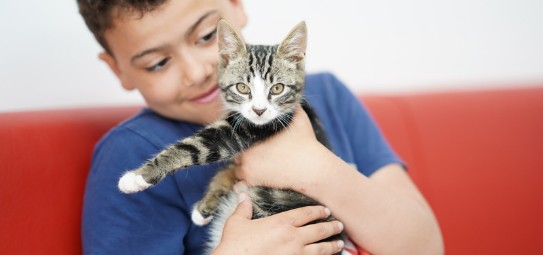
How to care for your pet snake
Snakes can be fascinating pets and at Molesey Vets we welcome them into our surgery with open arms. A snake Vet from our experienced team can provide consultations for your pet, as well as a weight clinic and health checks. You’ll be matched with a highly experienced snake Veterinarian and they’ll be able to offer advice on a range of subjects including nutrition, husbandry and sex determination. Read about the types of consultations we can offer your snake.
Book a snake vet consultation
We recommend your bring your newly acquired snake in for a health check before you take it home and, from then on, yearly health checks.
These health checks aim to create awareness of proper feeding and home care, as well as how to diagnose and treat any existing health problems that are early in the disease process.
Our health checks include a full physical examination where your vet will examine your snake from nose to tail for outward signs of disease.
Further tests are available at additional cost, and these include:
- Faeces (Poop) examination – This examination looks for signs of parasites. If you could supply the vet with a fresh sample at the time of consultation that would be useful.
- Blood work – A blood sample to aid in determining the health status of your snake, and to identity any problems with their blood.
- Further imaging such as x-ray and ultrasound imaging.
You will be asked a series of important questions about your snake including:
- Where it originated from (breeder, pet shop, wild caught).
- It’s current housing and internal fixtures (aquarium tank, desert or tree dwelling set up etc.).
- Is it housed with other snakes? Have there been any new additions recently?
- Were any quarantine procedures set in place? (I.e. was the snake kept separate for a period, before being introduced to your other snakes).
- What bedding or substrate is used in their cage (e.g. Sand, wood chips).
- Environmental conditions including temperature gradients (high and low measurements, day and night) and lighting used (brand and spectrum provided).
- What water source has been provided (drinking and soaking).
- Diet, including content and frequency of feeding. Live prey? Frozen? Stunned?
- When did your snake last shed.
It is a good idea for you to have thought about these issues and checked that you know as many details as possible before your visit.
When it comes to snake nutrition, each species has it’s own nutritional needs.
The frequency of feeding is very important as snakes are often overfed in captivity.
Younger snakes that are still growing may need feeding every 2-3 days. Small to medium adult snakes will need feeding weekly, and very large species as little as 4-5 times per year!
If you’re unsure, then ask your vet during a consultation about the frequency you should feed your snake.
Snakes in captivity often need diets supplements to provide balanced nutrition (for example, calcium and vitamin D3). This can be discussed in detail during your consultation – it is important to understand that, whilst supplementation is often necessary, it should only be carried out under veterinary guidance. This is because overdoses are possible and potentially very serious.
Again, the food items used are dependent on what species of snake you have. The items need to be of good quality and free from disease.
We usually do not recommend the feeding of live prey for many reasons. One of the main reasons is the potential for injuries to your snake caused by live prey items such as rats and mice. You also need to consider the welfare considerations for the poor prey!
Husbandry is essentially the ‘care’ that you provide for your snake and includes housing, bedding (substrate), hides (caves, plants etc.), heating and lighting.
The husbandry your snake receives is affected by their sex, so it’s important to know your snake’s gender – see information below on Sex Determination.
With approximately 3000 species of snake recorded, each species of snake has very it’s own specific husbandry needs. If you’re thinking about keeping a snake as a pet, it is important that you know these requirements. Don’t worry, we can help!
If you’re unsure of it’s species then our trained snake specialist can help identify it during your consultation. If it is an unusual species we may have to take some photos and do some research after the consultation.
The vast majority of problems we see with pet snakes are related to problems with husbandry.
Areas you need to consider, and which can be discussed further with your vet are:
- Housing – How does you snake live in it’s natural environment? Is it tree dwelling, a desert species, ground dwelling or a water snake?
- Substrate – What bedding (or substrate) do you use? Some types do look nice, but can actually be quite irritating – or even toxic – to your snake. It may even eat the bedding which can lead to internal blockages. This is a problem we do see on a regular basis.
- Hides – Remember, most snakes do not like being out in the open or exposed. They need to be able to choose from a selection of hides in areas of appropriate temperature and humidity. If they don’t have the option to hide or rest then they can develop stress associated and reproductive diseases..
- Heating– Snakes are ectothermic; they are almost completely incapable of generating body heat. They require appropriate environmental temperatures to achieve body temperatures necessary for metabolism (movement, digestion). A range of temperatures (the preferred optimum temperature zone or POTZ) is desirable so that your snake can chose a comfortable area. Again, understanding the species of your snake is essential in providing the right type of heat.
- Lighting – Diurnal snakes (those active during daylight) need exposure to full spectrum UV lighting (UVA = 400-315nm, UVB= 315-280nm) to support vision and crucial physiological processes such as calcium absorption. Recent studies have shown that many UV bulbs on the market do not meet the minimum requirements for UV emission. We recommend regular replacement of UV bulbs, every 6 months, as well as monitoring of UV output with a UV meter. We do have a UV meter, so if you’re unsure then bring your bulb to the consultation and we will be able to check it.
- Humidity – Is you snake from a desert or rainforest environment? Humidity requirements will vary drastically. Inappropriate levels can effect hydration, skin health and shedding.
The husbandry your snake receives is affected by their sex, so it’s important to know your snake’s gender. It can also determine what certain disease processes he/she is susceptible to (for example female snakes developing follicular stasis or egg binding).
At our clinic, we can usually determine the sex of your pet snake fairly easily.
Our specially trained vets can safely, cleanly and effectively determine sex using a technique called probing. A metal probe is inserted in the vent (the hole through which poop is passed) and by doing this your vet will be able to determine whether you have a boy or a girl. This process doesn’t need to take place under anesthetics, and can be completed whilst you wait.
Should your snake be taken ill, your vet may need to hospitalise them either for a short period of a day or two whilst investigations are underway, or for longer periods whilst they are being treated.
We have a designated exotics room (our ‘hot ward’) that has been optimised for your snake’s environment, providing the conditions essential to recovery. As with all reptiles, snakes are ectothermic, or cold- blooded, and rely entirely on the environment around them to drive their metabolism.
Providing them with the correct environment is the most influential factor in raising a healthy, happy snake.
Your snake and its environment are frequently monitored during it’s stay in our hospital. Any of it’s treatments are provided by our team veterinary nurses.
We carry a large selection of food items. However, if your snake has a particular favourite or has a specific dietary need you may be asked to bring some food in for the duration of it’s stay.
It’s hard to believe, but it is possible for your snake to get fat!
In fact, it is quite common for snakes in captivity to be overweight owing either to being fed too much, too often or simply eating the wrong type of food items.
The good news is that our team of specialist snake veterinarians can help you with practical advice to try and get your snake back into a healthier condition.
To help avoid obesity issues we recommend regular weighing and measuring of your snake so that your vet can determine his/her BODY CONDITION SCORE. This is simply a quantitative assessment of weight to size and body fat to muscling. Should it be needed, this can be done during the physical examination.
Also, don’t forget to collect your Molesey Card – our free loyalty card which gives you 1% back on everything you spend with us! The Molesey Card lets you collect points that can be redeemed against our services. We even give you 500 points (=£5) to get you started! Remember, it’s completely free to join, so ask at reception for more details when you arrive – learn more.
If you would like more advice on caring for snakes, contact our friendly team who will be happy to help.
You might also like to read:





